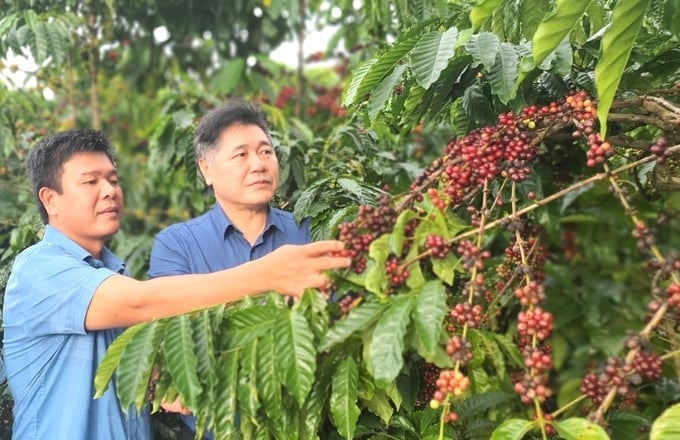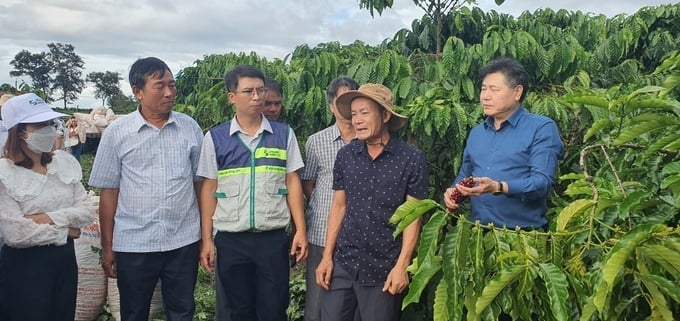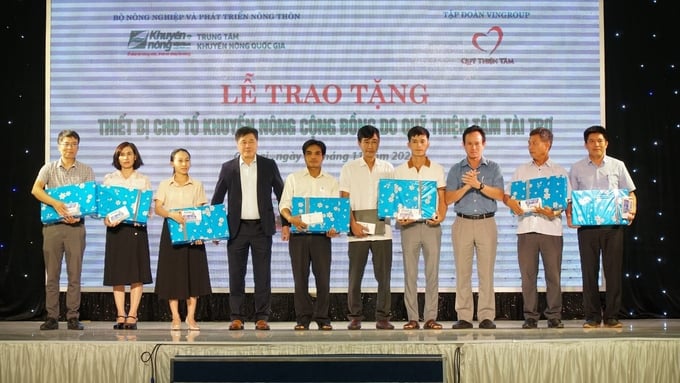May 30, 2025 | 16:27 GMT +7
May 30, 2025 | 16:27 GMT +7
Hotline: 0913.378.918
May 30, 2025 | 16:27 GMT +7
Hotline: 0913.378.918
The National Agricultural Extension Center, in collaboration with Gia Lai province's Department of Agriculture and Rural Development, organized a workshop on "Community agricultural extension in developing coffee raw material areas in the Central Highlands" on November 17.
After nearly two years of implementation, the project "Improving efficiency of agricultural extension activities based on the comprehensive model of community agricultural extension groups" has achieved significant results.
Accordingly, the pilot project has been implemented in 13 provinces across 5 coffee raw material areas, resulting in the establishment of 26 community agricultural extension groups. In addition, participating provinces have established community agricultural extension groups to serve the coffee raw material project.

Mr. Le Quoc Thanh, Director of the National Agricultural Extension Center (right), visiting a sustainable coffee production model in Dak Ha district, Kon Tum province. Photo: Tuan Anh.
The community agricultural extension groups have collaborated with various businesses to establish production linkages for coffee consumption in the four Central Highlands provinces. Accordingly, two pilot community agricultural extension groups in Gia Lai province have signed a memorandum of understanding with Vinh Hiep Limited Liability Company to organize training sessions and provide technical guidance on sustainable coffee production and occupational safety for coffee farmers.
Two pilot community agricultural extension groups in Kon Tum province have entered into a partnership agreement with Vinh Hiep Limited Liability Company and a cooperative agreement with 373 households in the production and consumption of nearly 2,000 tons of 4C coffee beans. Furthermore, Vinh Hiep Limited Liability Company has supported the implementation of 50 training sessions on sustainable coffee production; collaborated on assessments to grant 4C certification to participating households. To date, the community agricultural extension groups have assisted Vinh Hiep Limited Liability Company in expanding an additional 570 hectares of 4C-compliant coffee raw materal areas.
Two pilot community agricultural extension groups in Dak Lak province have established a coffee consumption linkage with Vinh Hiep Limited Liability Company. Additionally, the company has supported local coffee farmers through training and technical guidance sessions. Similarly, two pilot community agricultural extension groups in Dak Nong province have signed memorandum of understanding with two companies for the consumption of coffee products.
Mr. Doi Van Cuong, Head of the Community Agricultural Extension Group in Ha Mon commune, Dak Ha district, Kon Tum province, reported that the two community agricultural extension groups in Dak Mar and Ha Mon communes have achieved remarkable results since their establishment. These groups have collaborated with the Kon Tum Provincial Agricultural Extension Center to organize five training courses on technological transfer in agricultural production. Furthermore, they have implemented three agricultural extension models for intercropping durian trees in coffee farms, sustainable intercropping of durian and coffee, and intercropping cashew trees in coffee farms in Dak Ha district. Notably, in collaboration with the Dak Ha district's Agricultural Service Center, the groups planted macadamia trees on an area of 50 hectares.
According to Mr. Cuong, the community agricultural extension group in Ha Mon commune has supported Vinh Hiep Limited Liability Company in implementing 21 training courses on the 4C coffee production program with the participation of 840 farmers in 2023. This training program has allowed the company and cooperatives to sign cooperative agreements in the production and consumption of 4C coffee products. Most notably, Vinh Hiep Limited Liability Company has supported the cost of 4C inspection, evaluation, and certification for participating farmers.
In addition to the achievements, the pilot project of the community agricultural extension groups has encountered several challenges. Accordingly, democracy has not taken a strong role in the discussion and development of regulations. The participation and contributions of local community agricultural extension officers and local governments have not been fully utilized. As a result, these regulations are often constructed with an administrative nature.

The coffee industry in Gia Lai province is undergoing positive transformations towards sustainable production, thanks to the efforts of local community agricultural extension groups. Photo: Tuan Anh.
On the other hand, due to their recent establishment and initiation, the community agricultural extension groups are facing various challenges in terms of guidance, operational management, and the four task groups of market linkage, cooperative consulting, and farmer training in digital transformation. In practice, local community agricultural extension groups has only acted as a bridge between different parties.
Furthermore, members of the community agricultural extension groups exhibit limitations in knowledge necessary to perform their functions and tasks, particularly with regards to market development, cooperative management, value chain linkage, quality management, origin traceability, and agricultural digital transformation. Additionally, these groups encounter difficulties due to a lack of training equipment and funds to fulfill their tasks.
Mr. Doan Ngoc Co, Deputy Director of Gia Lai province's Department of Agriculture and Rural Development, stated that local community agricultural extension groups have made significant efforts over the years, contributing to the transfer of technology and providing consultation in the development of sustainable coffee raw material areas for local cooperatives and residents.
However, their activities have faced numerous challenges, with officers bearing multiple responsibilities, thereby failing to focus on supporting sustainable coffee development.
The most significant challenge for the community agricultural extension groups is financial constraints. Despite possessing several sources of income, these groups failed to secure sufficient funding for effective operations.
In response to these challenges, Gia Lai province has developed a plan to support local community agricultural extension groups. This plan aims to implement support for standardized production through community agricultural extension groups, including developing packaging and labels for coffee brands. It also involves supporting policies for the development of cooperatives and OCOP products, as well as credit policies in association with community agricultural extension groups.
"Gia Lai province hopes that the local community agricultural extension groups will assist farmers by providing consultation on production processes and enhancing the sustainable quality of coffee products," emphasized Mr. Co.

The Thien Tam Fund, which is managed by the Vingroup Corporation, donating equipment to community agricultural extension groups. Photo: Tuan Anh.
Mr. Le Quoc Thanh stated that the implementation and operation of community agricultural extension groups have yielded results beyond expectations, surpassing the framework of the pilot project. Local governments are actively engaged in this initiative. Most notably, the community agricultural extension groups have demonstrated exceptional results in coffee raw material areas.
"We hope that the establishment of community agricultural extension groups will facilitate technology transfer, promote collaboration with businesses and connection with consumer markets. In reality, these community agricultural extension groups are performing well and proving effective in these aspects," assessed Mr. Thanh.
According to Mr. Le Quoc Thanh, current activities of community agricultural extension groups are diverse, without a standardized model. Consequently, there is a need to further enhance the capacity of grassroots agricultural extension in order to attract additional participants to agricultural extension activities.
The most significant challenge at present is the uneven capacity of grassroots agricultural extension. Limitations in the capacity of grassroots agricultural extension will have a considerable impact on the development of the coffee raw material areas. As a result, there is a need to strengthen training for the grassroots agricultural extension groups.
Translated by Nguyen Hai Long

(VAN) Several scientists and farmers are experimenting with soil treatment in some key durian-growing regions such as Cai Lay (Tien Giang), Dak Song, Gia Nghia, and Dak R’lap (Dak Nong).
/2025/05/25/4127-3-073637_820.jpg)
(VAN) Thanks to the promotion from an FAO-implemented project, vegetable production in greenhouses in Moc Chau has seen strong development, from 1.5 hectares in 2021 to nearly 50 hectares in 2024.

(VAN) FAO has recently supported USD 140,000 to implement the project 'Risk mitigation human-animal interface risks through disease control initiatives in pig farming.'

(VAN) The People's Committee of Tra Vinh province has approved an adjustment to the investment policy for the Green Hydrogen Plant project, increasing its area to approximately 52.76 hectares.
![Reducing emissions from rice fields: [2] Farmers’ commitment to the soil](https://t.ex-cdn.com/nongnghiepmoitruong.vn/608w/files/news/2025/05/05/dsc08881jpg-nongnghiep-140632.jpg)
(VAN) Clean rice cultivation model in Thuong Tan commune, Bac Tan Uyen district, is assisting local residents in achieving sustainable agriculture by substantially reducing costs, increasing productivity, and protecting the environment.

(VAN) At the conference to disseminate Resolution No. 68, AgriS introduced its digital agricultural ecosystem and reaffirmed its commitment to accompanying the Government in promoting private sector development and sustainable agriculture.

(VAN) 'Blue Ocean - Blue Foods' initiative is designed to restore marine ecosystems and establish sustainable livelihoods for local communities by cultivating a minimum of 1,000 hectares of cottonii seaweed in the first three years.